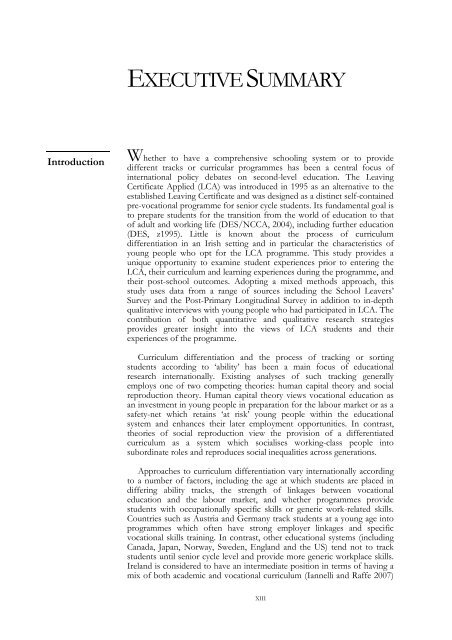Student Experiences of the Leaving Certificate Applied Programme
Student Experiences of the Leaving Certificate Applied Programme
Student Experiences of the Leaving Certificate Applied Programme
You also want an ePaper? Increase the reach of your titles
YUMPU automatically turns print PDFs into web optimized ePapers that Google loves.
EXECUTIVE SUMMARYIntroductionWhe<strong>the</strong>r to have a comprehensive schooling system or to providedifferent tracks or curricular programmes has been a central focus <strong>of</strong>international policy debates on second-level education. The <strong>Leaving</strong><strong>Certificate</strong> <strong>Applied</strong> (LCA) was introduced in 1995 as an alternative to <strong>the</strong>established <strong>Leaving</strong> <strong>Certificate</strong> and was designed as a distinct self-containedpre-vocational programme for senior cycle students. Its fundamental goal isto prepare students for <strong>the</strong> transition from <strong>the</strong> world <strong>of</strong> education to that<strong>of</strong> adult and working life (DES/NCCA, 2004), including fur<strong>the</strong>r education(DES, z1995). Little is known about <strong>the</strong> process <strong>of</strong> curriculumdifferentiation in an Irish setting and in particular <strong>the</strong> characteristics <strong>of</strong>young people who opt for <strong>the</strong> LCA programme. This study provides aunique opportunity to examine student experiences prior to entering <strong>the</strong>LCA, <strong>the</strong>ir curriculum and learning experiences during <strong>the</strong> programme, and<strong>the</strong>ir post-school outcomes. Adopting a mixed methods approach, thisstudy uses data from a range <strong>of</strong> sources including <strong>the</strong> School Leavers’Survey and <strong>the</strong> Post-Primary Longitudinal Survey in addition to in-depthqualitative interviews with young people who had participated in LCA. Thecontribution <strong>of</strong> both quantitative and qualitative research strategiesprovides greater insight into <strong>the</strong> views <strong>of</strong> LCA students and <strong>the</strong>irexperiences <strong>of</strong> <strong>the</strong> programme.Curriculum differentiation and <strong>the</strong> process <strong>of</strong> tracking or sortingstudents according to ‘ability’ has been a main focus <strong>of</strong> educationalresearch internationally. Existing analyses <strong>of</strong> such tracking generallyemploys one <strong>of</strong> two competing <strong>the</strong>ories: human capital <strong>the</strong>ory and socialreproduction <strong>the</strong>ory. Human capital <strong>the</strong>ory views vocational education asan investment in young people in preparation for <strong>the</strong> labour market or as asafety-net which retains ‘at risk’ young people within <strong>the</strong> educationalsystem and enhances <strong>the</strong>ir later employment opportunities. In contrast,<strong>the</strong>ories <strong>of</strong> social reproduction view <strong>the</strong> provision <strong>of</strong> a differentiatedcurriculum as a system which socialises working-class people intosubordinate roles and reproduces social inequalities across generations.Approaches to curriculum differentiation vary internationally accordingto a number <strong>of</strong> factors, including <strong>the</strong> age at which students are placed indiffering ability tracks, <strong>the</strong> strength <strong>of</strong> linkages between vocationaleducation and <strong>the</strong> labour market, and whe<strong>the</strong>r programmes providestudents with occupationally specific skills or generic work-related skills.Countries such as Austria and Germany track students at a young age intoprogrammes which <strong>of</strong>ten have strong employer linkages and specificvocational skills training. In contrast, o<strong>the</strong>r educational systems (includingCanada, Japan, Norway, Sweden, England and <strong>the</strong> US) tend not to trackstudents until senior cycle level and provide more generic workplace skills.Ireland is considered to have an intermediate position in terms <strong>of</strong> having amix <strong>of</strong> both academic and vocational curriculum (Iannelli and Raffe 2007)XIII

















